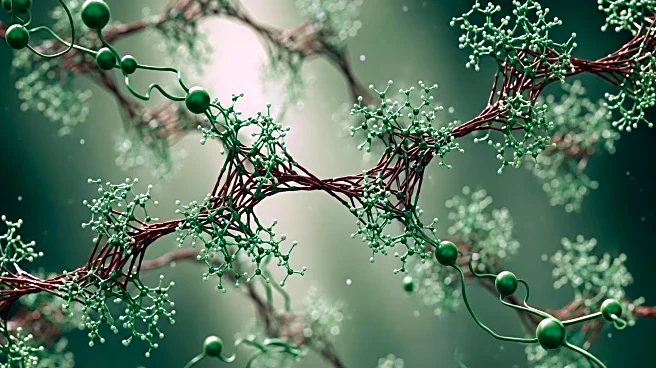What's Happening?
A study conducted by Northwestern University has uncovered how the bacterium Pseudomonas putida reorganizes its metabolism to digest lignin, a complex carbon found in plant waste. This bacterium adjusts its metabolic pathways, slowing some while accelerating others, to efficiently extract energy from lignin without depleting its resources. The research provides a quantitative blueprint of bacterial carbon metabolism and energy production during lignin digestion. This discovery is significant for the biomanufacturing industry, which aims to utilize Pseudomonas putida to convert lignin into biofuels, plastics, and other chemicals. The study offers insights into how bacteria naturally produce lignin-based chemical precursors, potentially offering an alternative to petroleum-based products.
Why It's Important?
The findings from this study have substantial implications for the biotechnology sector, particularly in the development of sustainable bio-based products. By understanding the metabolic processes of Pseudomonas putida, researchers can design more efficient microbial factories to convert plant waste into valuable chemicals, reducing reliance on petroleum. This could lead to advancements in producing renewable biofuels and biodegradable plastics, contributing to environmental sustainability. The study also highlights the delicate balance required in bacterial metabolism, cautioning against over-engineering, which could disrupt energy balance and hinder productivity. This knowledge is crucial for developing smarter strategies in biotechnological applications.
What's Next?
The study provides a roadmap for future research and development in microbial engineering. Scientists and engineers can now explore ways to optimize bacterial metabolism for industrial applications without disrupting its natural energy balance. This could involve further studies to identify specific metabolic pathways that can be enhanced for better efficiency in lignin processing. The biotechnology industry may also focus on developing new biological platforms that leverage the natural abilities of Pseudomonas putida, potentially leading to breakthroughs in sustainable manufacturing processes.
Beyond the Headlines
The research underscores the importance of understanding natural metabolic processes before attempting to modify them for industrial purposes. It raises ethical considerations about the extent to which organisms should be engineered for human benefit, balancing innovation with ecological impact. Additionally, the study may inspire further exploration into other microbes with similar capabilities, broadening the scope of sustainable biomanufacturing.










